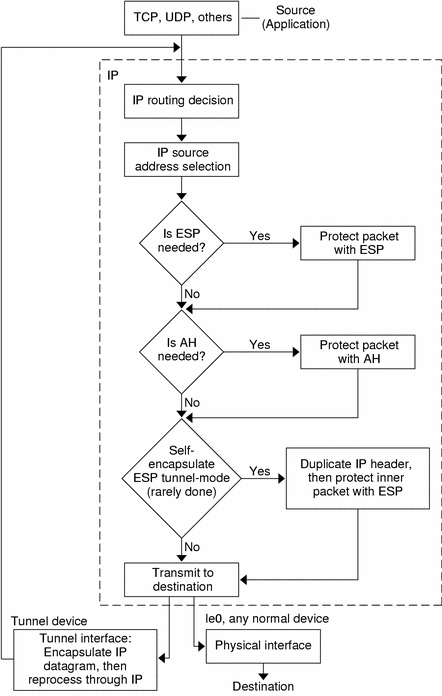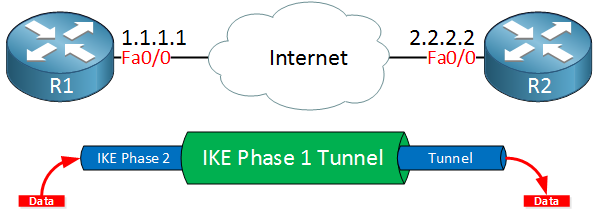Featured
Table of Contents
1. Define Ipsec? 2. What Ipsec Used For? 3. What Are The ...
These negotiations take two types, primary and aggressive. The host system that starts the process suggests file encryption and authentication algorithms and settlements continue till both systems choose the accepted procedures. The host system that starts the process proposes its preferred encryption and authentication methods but does not work out or alter its preferences.
When the information has actually been transferred or the session times out, the IPsec connection is closed. The private keys utilized for the transfer are erased, and the process comes to an end.
IPsec utilizes two main procedures to supply security services, the Authentication Header (AH) procedure and the Encapsulating Security Payload (ESP) protocol, in addition to several others. Not all of these procedures and algorithms need to be used the specific selection is figured out during the Settlements stage. The Authentication Header protocol validates information origin and stability and provides replay defense.
Internet Protocol Security (Ipsec)
The Kerberos protocol provides a centralized authentication service, enabling gadgets that use it to verify each other. Different IPsec implementations may use different authentication techniques, but the result is the very same: the safe transfer of information.
The transportation and tunnel IPsec modes have several key distinctions. Transportation mode is primarily used in scenarios where the two host systems communicating are relied on and have their own security procedures in place.
Encryption is used to both the payload and the IP header, and a new IP header is contributed to the encrypted package. Tunnel mode supplies a safe and secure connection in between points, with the initial IP package covered inside a brand-new IP packet for extra protection. Tunnel mode can be used in cases where endpoints are not trusted or are lacking security mechanisms.
Ipsec Vpn Concepts
This implies that users on both networks can engage as if they remained in the very same area. Client-to-site VPNs enable individual devices to connect to a network remotely. With this option, a remote employee can operate on the very same network as the rest of their group, even if they aren't in the same area.
(client-to-site or client-to-client, for example) most IPsec topologies come with both benefits and downsides. Let's take a closer look at the advantages and disadvantages of an IPsec VPN.
An IPSec VPN provides robust network security by securing and authenticating information as it takes a trip between points on the network. An IPSec VPN is versatile and can be configured for different usage cases, like site-to-site, client-to-site, and client-to-client. This makes it an excellent choice for companies of all sizes and shapes.
1. Define Ipsec? 2. What Ipsec Used For? 3. What Are The ...


IPsec and SSL VPNs have one main distinction: the endpoint of each procedure. In many cases, an IPsec VPN lets a user connect from another location to a network and all its applications. On the other hand, an SSL VPN creates tunnels to specific apps and systems on a network. This limits the ways in which the SSL VPN can be used however reduces the possibility of a compromised endpoint leading to a wider network breach.
For mac, OS (by means of the App Shop) and i, OS versions, Nord, VPN uses IKEv2/IPsec. This is a combination of the IPsec and Web Secret Exchange variation 2 (IKEv2) protocols.
Stay safe with the world's leading VPN.
How Does A Vpn Work? Advantages Of Using A Vpn
Prior to we take a dive into the tech stuff, it's crucial to observe that IPsec has rather a history. It is interlinked with the origins of the Web and is the outcome of efforts to establish IP-layer encryption techniques in the early 90s. As an open procedure backed by constant development, it has actually proved its qualities over the years and although challenger protocols such as Wireguard have actually arisen, IPsec keeps its position as the most extensively used VPN procedure together with Open, VPN.
SAKMP is a procedure used for developing Security Association (SA). This procedure includes two steps: Stage 1 develops the IKE SA tunnel, a two-way management tunnel for essential exchange. Once the communication is developed, IPSEC SA channels for protected data transfer are established in phase 2. Attributes of this one-way IPsec VPN tunnel, such as which cipher, approach or key will be utilized, were pre-agreed by both hosts (in case of IPsec VPN, this is a connection in between an entrance and computer system).
IPsec VPNs are widely used for several factors such as: High speed, Extremely strong ciphers, High speed of establishing the connection, Broad adoption by running systems, routers and other network devices, Of course,. There are alternative choices out there such as Open, VPN, Wireguard and others (see the list of important VPN protocols on our blog).
How Does A Vpn Work? Advantages Of Using A Vpn
When developing an IKEv2 connection, IPsec uses UDP/500 and UDP/4500 ports by default. By standard, the connection is developed on UDP/500, but if it appears throughout the IKE facility that the source/destination lags the NAT, the port is changed to UDP/4500 (for info about a strategy called port forwarding, check the short article VPN Port Forwarding: Excellent or Bad?).
The purpose of HTTPS is to secure the content of interaction between the sender and recipient. This guarantees that anybody who wants to obstruct communication will not be able to discover usernames, passwords, banking details, or other delicate information.
All this info can be seen and kept track of by the ISP, federal government, or misused by corporations and enemies. To eliminate such risks, IPsec VPN is a go-to service. IPsec VPN works on a different network layer than SSL VPN. IPsec VPN runs on the network layer (L3) while SSL VPN operates on the application layer.
Ipsec Configuration - Win32 Apps

When security is the primary issue, modern-day cloud IPsec VPN should be selected over SSL considering that it secures all traffic from the host to the application/network/cloud. SSL VPN secures traffic from the web browser to the web server just. IPsec VPN protects any traffic in between 2 points recognized by IP addresses.
The problem of picking in between IPsec VPN vs SSL VPN is carefully related to the topic "Do You Need a VPN When A Lot Of Online Traffic Is Encrypted?" which we have actually covered in our recent blog site. Some might believe that VPNs are hardly needed with the rise of built-in encryption straight in email, internet browsers, applications and cloud storage.
Latest Posts
5 Best Vpns For Mobile Data To Protect Your Privacy
Top Mobile Vpns For The Enterprise - Cso Online
Cisco Mobile Vpn